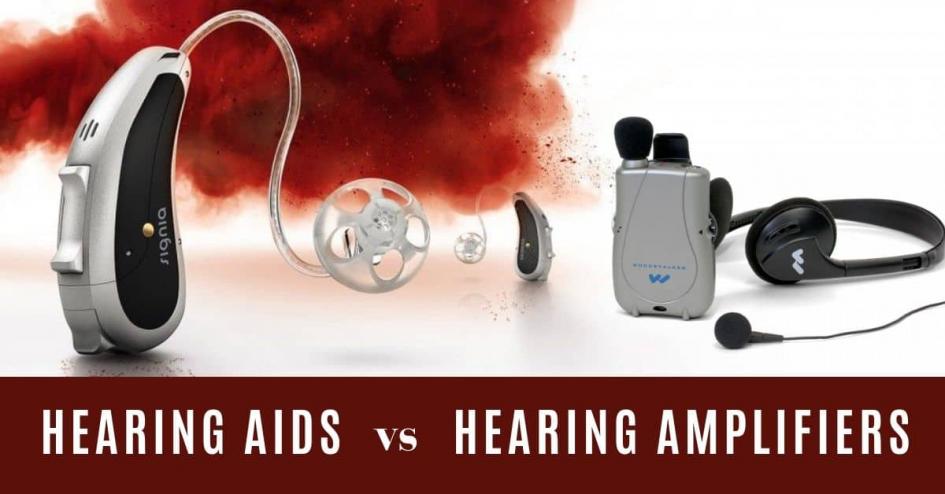
Hearing Aids vs. Hearing Amplifiers
The American Food and Drugs Administration (FDA) recently released a warning about hearing amplifiers, deeming them ‘not intended to compensate for impaired hearing’. Instead, they recommended hearing aids for those with hearing loss. This warning however has not stopped consumers being tempted by a recent string of online adverts for hearing amplifiers for their own hearing loss. Unfortunately, these adverts have contributed to the public perception of hearing amplifiers as similar to hearing aids, when in fact there are key differences between the two. They may look similar and appear to serve the same purpose, but far from being devices similar in performance, those with hearing loss are actually better served by a hearing aid in the long term.
The differences between the two
Hearing amplifiers and hearing aids can both enhance our listening ability. The biggest difference is that hearing aids are intended for people with hearing problems, but hearing amplifiers are not. People with normal hearing can use a hearing amplifier to raise surrounding volume levels while watching TV and to give them an extra boost when out at restaurants and cinemas. Hearing aids use subtler means to improve hearing for the user. They not only heighten sounds, they enable users to distinguish between the person in front of them and and the surrounding environment. Hearing aids can also modify settings according to the environment the user is in. Different settings can be chosen depending on whether the user is in a noisy restaurant or merely relaxing at home. It is true that hearing aids take longer to adapt to than hearing amplifiers, because the brain has to learn to understand sounds that it hasn't had to process in a long time. It's normal therefore for new hearing aid users to make regular return trips to their hearing professional to make changes to the fit of the device. But once the wearer finally gets used to their hearing aid, it helps their brain to hear far better in the long run.
The problem with hearing amplifiers
Here are some of the key issues with hearing amplifiers that we see when compared to hearing aids.
1. Hearing amplifiers are used without a diagnosis
In the UK, only after careful assessment and diagnosis of your hearing health are healthcare professionals able to fit a hearing aid, whether the they are acquired on the NHS or through a private practice. Although they are also available online, getting them fitted by a hearing professional is the recommended way to buy hearing aids. Hearing amplifiers, on the other hand, does not involve a medical diagnosis or professional fitting. The fact that they are relatively cheap too makes them a tempting option over hearing aids. People often confuse them with hearing aids and believe that they offer all the benefits of hearing aids at a much lower price. This, sadly is not the case.
2. They prevent those with hearing loss from treating their hearing
People often use hearing amplifiers to alleviate their hearing loss which they do not realize they have. This prevents them from successfully treating their hearing loss properly and in a timely manner. To diagnose hearing loss, a hearing test is absolutely necessary. The FDA have been aware of this problem for some time. Dr. Eric Mann of the FDA states that, if used improperly, personal sound amplifiers can cause additional hearing loss. If no suitable assistance for hearing loss is sought by the individual, hearing loss can further deteriorate. In that time, the individual may go from a mild hearing loss to something more severe: “It can cause a delay in diagnosis of a potentially treatable condition. And that delay can allow the condition to get worse and lead to other complications.” To protect the hearing health of the population in Scotland and other parts of the UK, perhaps it is high time that Department of Health published similar guidelines here.
Take a hearing test first
Hearing amplifiers have their place and can definitely help a lot of people in many different situations. But they are no substitute for treating hearing loss. Before deciding on which device is suitable for you, it’s best to take a hearing test first. This will let you know whether you have hearing loss, which means you will benefit much more with a hearing aid.
House of Hearing
If you think you have hearing loss, come and see us for a test. We offer comprehensive hearing test and a full suite of the latest hearing aids. Schedule your appointment today with House of Hearing!
Our Clinics
All House of Hearing clinics are in town centre locations and accessible to public transport and parking. Home visits also available if mobility is an issue.


.png)
.png)
.png)

.png)
